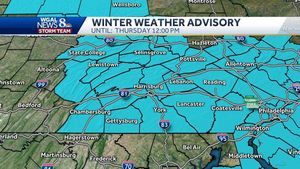PORTLAND, Ore. — A winter weather advisory is now in effect for the Portland metro area, following forecasts of potentially disruptive snow showers throughout Wednesday morning. The National Weather Service (NWS) has issued this advisory, which will be effective from midnight Tuesday through noon on Wednesday, due to expected accumulations across lowland areas and impacts on local travel.
Forecasters predict Tuesday night will see widespread moisture moving across the region, leading to mixed precipitation as some areas hover around freezing. KGW’s meteorologist Chris McGinness stated, "Snow showers could become more frequent Wednesday morning as temperatures are near freezing." The advisory encompasses much of northwest Oregon and parts of southwest Washington, indicating significant weather events for commuters and residents alike.
Many parts of the metro area could see snow totals range from nothing to about one inch, particularly on grassy surfaces or roads where conditions are favorable for accumulation. KOIN notes, "Snow totals around Portland and Vancouver could amount to nothing or up to about one inch, briefly collecting on roads or grassy surfaces, especially within hillier neighborhoods." Some rural areas above 1,000 feet may experience more significant totals between 3 to 6 inches.
The situation is complicated by the fact the cold, arctic air typical of impactful snowstorms has not been observed. Instead, the moderate south wind brought by the moist system could lead to slushy conditions rather than widespread accumulation. The continuing mix of rain and snow is expected to transition to rain by Wednesday afternoon, with highs climbing to around 40 degrees. This temperature increase will likely melt any snow accumulation, leading to the mass potential for icy conditions overnight.
The NWS has also indicated potential travel hazards for the Wednesday morning commute. "If showers are heavy enough, there will be light accumulations. But these are showers, so it’ll be spotty," noted one local forecast report, highlighting the unpredictability of the storm pattern. Drivers are urged to exercise caution, allowing extra time to navigate slick and potentially icy roadways.
Local authorities are preparing for the incoming weather, with Multnomah County declaring a weather emergency and opening severe weather emergency shelters. Washington County confirms it will open additional shelters from Tuesday afternoon, aimed at assisting vulnerable populations during the cold snap.
Looking forward, the forecasts reveal the possibility of refreeze on roads after temperatures drop overnight and precipitation subsides. Expect conditions to remain icy Thursday morning, particularly where roads have previously seen moisture.
While Portland residents brace for this weather event, other parts of the state are dealing with heavier snowfall. Particularly, southern Oregon is likely to witness multiple inches, with meteorologists mentioning reports of 4 to 6 inches even in the Rogue Valley area. This level of snow draws attention to the tougher travel conditions predicted for surrounding mountain roads and rural areas.
For those who must travel, the NWS has recommended having winter emergency kits ready, complete with essentials such as flashlights, batteries, blankets, and food supplies. Staying informed about changing weather conditions is important, especially with the likelihood of severe weather at higher elevations throughout the week.
Overall, the rest of the week looks to temper conditions with cooler nights, but the prospect for widespread snowfall diminishes significantly as temperatures stabilize. Meteorologists suggest monitoring updates from local weather services such as KOIN and KGW as conditions might continue to evolve rapidly.
This story will be updated as weather conditions change, so be sure to follow local news for the most current updates.



